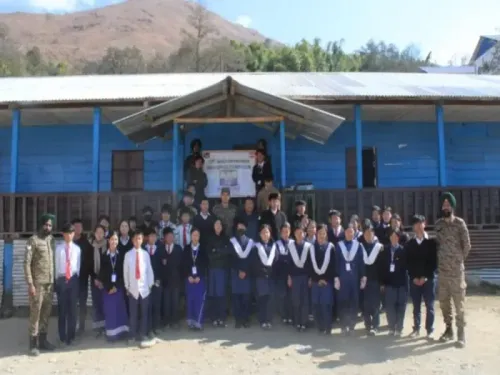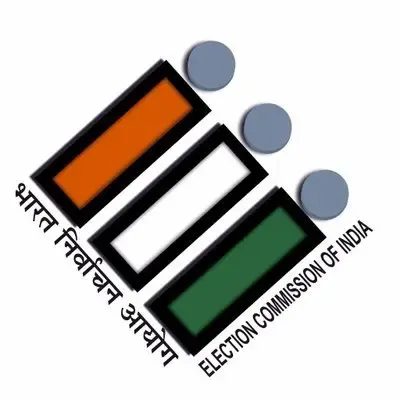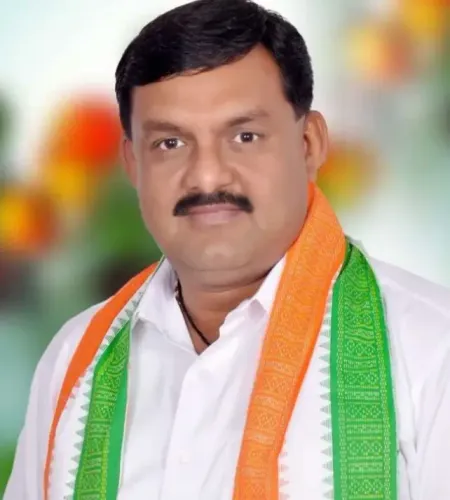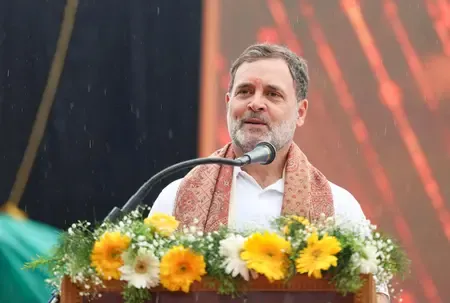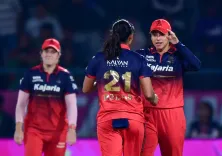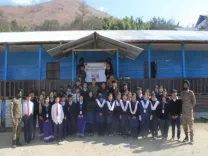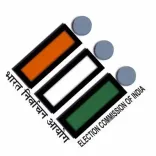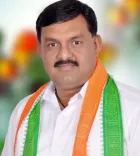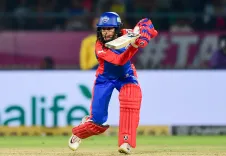Winter Whacking: PM Modi Critiques Gandhi Family, Highlights Government Accomplishments
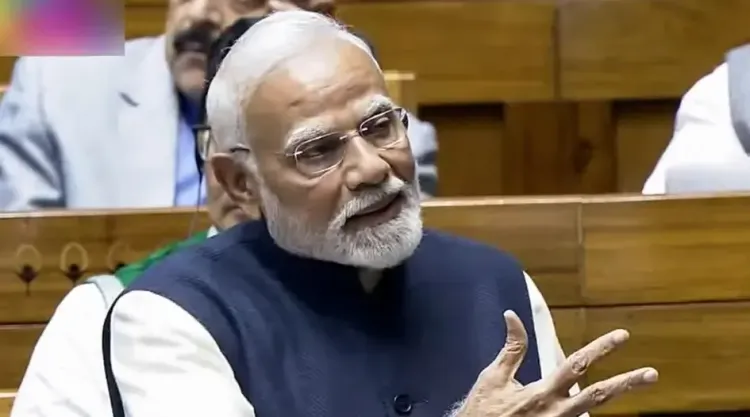
New Delhi, Dec 15 (NationPress) Prime Minister Narendra Modi, during his extensive speech lasting over 100 minutes in the Parliament on Saturday, launched a vigorous assault on the Gandhi family and the Congress party on the second day of the debate about the Constitution, celebrating its 75th anniversary. He criticized the historic party and its former leaders, notably the first Prime Minister Jawaharlal Nehru for establishing the trend of amending the Constitution, and took a jab at former Prime Minister Indira Gandhi for the Emergency declared in the nation in 1975.
Below is the complete transcript of PM Modi's speech in the Lok Sabha:
In his address, PM Modi expressed that it is a moment of great pride and honor for every citizen of India and for those worldwide who hold democracy in high regard, as we commemorate this festival of Democracy.
He acknowledged the foresight, vision, and relentless efforts of the Constitution's framers throughout this significant journey of 75 years since its inception, stating that it is indeed the time to celebrate this festival of Democracy after this remarkable milestone.
PM Modi expressed delight that even members of Parliament were actively participating in this celebration and sharing their insights, for which he extended his gratitude and congratulations.
Describing the accomplishment of 75 years as an incredible achievement, the Prime Minister felt proud that the Constitution had triumphed over all anticipated challenges faced by India post-independence.
He expressed his gratefulness to both the Constitution's architects and the millions of citizens who contributed towards this monumental achievement.
According to PM Modi, the people of India have successfully embraced and lived by the values enshrined in the Constitution, earning them all accolades.
He asserted that the framers of the Constitution did not subscribe to the notion that India was birthed in 1947 or that the Constitution took effect in 1950, but instead were proud of India's rich tradition and democratic heritage.
PM Modi emphasized that India’s legacy of democracy and republic has always been exceptional, serving as an inspiration worldwide, thus coining the phrase, "India is recognized as the mother of democracy". He highlighted that we are not only a great democratic nation but also the originators of democratic principles.
Quoting Rajarshi Purushottam Das Tandon from constitutional debates, the Prime Minister remarked: "It is after centuries that such a significant gathering is warranted, reminiscent of our illustrious past where intellectuals engaged in meaningful discussions in the sabhas."
He further quoted Dr. S. Radhakrishnan, stating: "The essence of a Republic is not a novel concept for our great nation, as we have upheld this system since the dawn of our history."
Moreover, he cited Dr. Babasaheb Ambedkar, asserting, "India has long been cognizant of democracy; there existed a time of multiple republics within India."
PM Modi praised the contribution of women in the Constitution's formation and their ongoing empowerment. He noted that the Constituent Assembly had 15 esteemed and active female members who significantly enriched the Constitution drafting process with their diverse insights.
He expressed pride that women were granted suffrage right from independence, contrasting with several nations where this took decades.
Continuing this spirit, India showcased the vision of women-led development during its G20 presidency. The Prime Minister also acknowledged the successful passage of the Narishakti Vandan Adhiniyam by all parliamentarians and noted the government's initiatives to enhance women's political participation.
PM Modi reiterated that women are at the core of every major policy decision and expressed joy that coincidentally, during the 75th anniversary of the Constitution, a tribal woman held the office of the President of India, exemplifying the spirit of our Constitution.
He highlighted that women's representation and contributions are consistently growing in both Parliament and the Council of Ministers.
"The representation and contributions of women across various fields, whether social, political, educational, or sports, continue to elevate India's stature," asserted PM Modi, showcasing the impact of the Constitution as the greatest source of inspiration.
Reaffirming India's rapid progress, PM Modi predicted that India would soon emerge as the third-largest economy globally, driven by the collective resolve of 140 crore Indians to ensure development by 2047. He stressed that the unity of India is crucial for this aspiration to materialize.
The Prime Minister emphasized that our Constitution serves as the foundation for India's unity.
He recounted that the Constitution was framed by distinguished freedom fighters, scholars, social reformers, educators, and professionals from diverse backgrounds, all acutely aware of the significance of India's unity.
PM Modi expressed regret that post-independence, while the Constitution’s creators were united in spirit, distorted attitudes and selfish interests inflicted severe damage to the nation's core essence of unity.
He pointed out that celebrating diversity has always been India's hallmark and stressed that the country’s progress hinges on honoring this diversity. Nonetheless, he lamented that colonial mindsets and those who failed to recognize India's strengths attempted to sow discord within this diversity.
PM Modi urged everyone to integrate the celebration of diversity into their lives, as this would constitute a genuine homage to Dr. B.R. Ambedkar.
He noted that over the past decade, the government's policies have consistently aimed at reinforcing India's unity. He asserted that Article 370 was a hindrance to national unity and needed to be dismantled. The Prime Minister reiterated that prioritizing the unity of the nation aligns with the Constitution's spirit, which is why Article 370 was abrogated.
He emphasized the importance of fostering favorable conditions in India for economic advancement and attracting global investments. He remarked that discussions surrounding GST had been ongoing for an extended period. The Prime Minister acknowledged GST’s pivotal role in economic cohesion, recognizing the contributions of the prior government while noting that the current administration had the opportunity to implement it, advancing the concept of "One Nation, One Tax".
Addressing the significance of ration cards as essential documents for the underprivileged, PM Modi highlighted the difficulties faced by the poor when relocating between states, often resulting in denial of benefits.
He stressed that every citizen should possess equal rights, regardless of their location within the country, and stated that to strengthen this sense of unity, the government reinforced the "One Nation, One Ration Card" initiative.
The Prime Minister asserted that providing free healthcare to the underprivileged significantly bolsters their capacity to combat poverty. He emphasized that healthcare should be accessible where they work and also in emergencies elsewhere. To uphold national unity principles, the government introduced the "One Nation, One Health Card" initiative through Ayushman Bharat.
He explained that even individuals from remote regions, such as a person from Bihar working in Pune, could access necessary medical services using an Ayushman card.
PM Modi recalled times when one region of the country had power while another suffered from outages due to supply issues, noting that past governments often faced international criticism for power shortages. He emphasized that to maintain the Constitution's spirit and the mantra of unity, the government implemented the "One Nation, One Grid" initiative, ensuring uninterrupted electricity across India.
Discussing infrastructure development, the Prime Minister indicated that the government is focused on equitable development to reinforce national unity. He mentioned that initiatives aim to empower infrastructure throughout regions such as the North East, Jammu and Kashmir, Himalayan regions, and desert areas, striving to eliminate feelings of isolation due to lack of development and thereby fostering unity.
Highlighting the digital divide between the "haves" and "have-nots", PM Modi noted that India's success story in Digital India is a source of global pride. He pointed out that democratizing technology has been crucial to this success. The Prime Minister stated that, guided by the vision of the Constitution's framers, the government worked to extend fiber optic connections to every panchayat in India, furthering national unity.
He emphasized that the Constitution mandates unity and recognizes the significance of mother tongues. He stated that suppressing one’s native language cannot enrich the nation culturally. PM Modi remarked that the New Education Policy has accorded considerable emphasis on mother tongues, allowing even underprivileged children to become doctors and engineers in their native languages. He underscored that the Constitution supports all citizens and mandates addressing their diverse needs, giving classical languages their rightful recognition and respect. He noted that initiatives like "Ek Bharat Shreshtha Bharat" are strengthening national unity and instilling cultural values in younger generations.
Highlighting the cultural events like the Kashi Tamil Sangamam and Telugu Kashi Sangamam, PM Modi stressed that these initiatives solidify societal bonds. He reiterated that the importance of unity is embedded in the core principles of the Constitution and should be acknowledged.
The Prime Minister observed that while the Constitution is celebrating its 75th anniversary, other milestones, such as the 25th, 50th, and 60th anniversaries, also hold significance. He reflected on history, recalling that during the 25th anniversary, the Constitution faced significant turmoil in the country. He noted that the Emergency was imposed, constitutional arrangements were dismantled, and the country turned into a prison, with citizens' rights curtailed and press freedoms suppressed.
PM Modi stated that democracy was stifled, and the sacrifices of the Constitution's framers were disregarded.
He noted that under former PM Atal Bihari Vajpayee's leadership, the nation celebrated the Constitution's 50th anniversary on November 26, 2000. PM Modi remarked that Vajpayee delivered a special message to the nation highlighting the importance of unity, public engagement, and collaboration. He noted that former PM Vajpayee's efforts aimed at embodying the spirit of the Constitution and awakening public consciousness.
Reflecting on his journey, PM Modi shared that during the 50th anniversary of the Constitution, he had the honor of becoming Chief Minister through the constitutional process. He recalled that during his tenure, the 60th anniversary of the Constitution was celebrated in Gujarat. For the first time in history, the Constitution was displayed in a special arrangement on an elephant, and a Constitution Gaurav Yatra was conducted. PM Modi emphasized the Constitution's significance and noted an instance in the Lok Sabha where a senior leader questioned the necessity of celebrating Constitution Day on November 26 when January 26 already existed.
He expressed satisfaction regarding the special session, noting that discussions on the Constitution's power and diversity would have been beneficial for the new generation. However, he remarked that everyone had their constraints and misgivings, with some revealing their shortcomings. The Prime Minister emphasized the need for discussions to transcend partisan sentiments and focus on national interests for the benefit of future generations.
PM Modi expressed profound respect for the Constitution, stating that its spirit has enabled many individuals, including himself, to achieve their current positions. He highlighted that it was the Constitution's power and the people's blessings that propelled them forward without any background. He noted that many in similar circumstances have attained significant roles due to the Constitution. He added that it is a tremendous fortune that the nation has exhibited immense faith in its leaders multiple times, which would not have been possible without the Constitution.
He noted that from 1947 to 1952, India lacked an elected government, having only a temporary, selected administration with no elections conducted. PM Modi emphasized that prior to 1952, the Rajya Sabha was absent, and state elections were not held, indicating no public mandate. He highlighted that despite this, an ordinance was issued in 1951 to amend the Constitution, infringing upon freedom of expression, which he deemed an affront to the Constitution's framers, as such matters were not addressed in the Constituent Assembly. He remarked that when an opportunity arose, actions were taken to undermine freedom of expression, which was a profound insult to the Constitution's architects.
He highlighted that in 1971, a Supreme Court judgment was overturned through a constitutional amendment, curtailing the judiciary's authority. PM Modi pointed out that the amendment declared that Parliament could modify any article of the Constitution without judicial review, thus limiting the courts' powers and allowing the then-government to suppress fundamental rights and control the judiciary.
During the Emergency, he noted, the Constitution was abused, and democracy was suppressed. He emphasized that in 1975, the 39th Amendment was enacted, shielding the elections of the President, Vice President, Prime Minister, and Speaker from judicial scrutiny, which was applied retroactively to encompass past actions.
Elaborating on the Emergency period, PM Modi noted that rights were stripped from citizens, thousands were imprisoned, the judiciary was silenced, and media freedom was curtailed. He remarked that the concept of a committed judiciary was firmly implemented. He recalled that Justice H.R. Khanna, who ruled against the then-Prime Minister in a legal case, was denied the Chief Justice position despite his experience, which he viewed as a violation of constitutional and democratic principles.
He highlighted the Supreme Court's ruling in the Shah Bano case, which provided justice to an Indian woman, emphasizing the Constitution's dignity and spirit. PM Modi noted that the Supreme Court granted an elderly woman her rightful due, only for the then-Prime Minister to negate this, thus undermining the Constitution's essence. He remarked that Parliament subsequently enacted a law to reverse the Supreme Court's decision once more.
The Prime Minister noted that for the first time in history, the Constitution suffered deep wounds.
He stated that the framers envisioned an elected government and Prime Minister; however, a non-constitutional entity, the National Advisory Council, which took no oath, was positioned above the Prime Minister's Office (PMO). He emphasized that this entity was given an unofficial status above the PMO.
PM Modi asserted that under the Indian Constitution, the populace elects the government, and the head of that government forms the Cabinet.
Recounting an incident where a Cabinet decision was publicly disregarded by individuals who disrespected the Constitution, PM Modi stated that these individuals habitually manipulated the Constitution with little regard. He lamented that it was unfortunate that the Cabinet ultimately altered its decision.
The Prime Minister highlighted that while Article 370 is widely known, few are informed about Article 35A. He emphasized that Article 35A was enacted without parliamentary consent, which should have been sought. The Prime Minister noted that the Parliament, as the primary guardian of the Constitution, was bypassed, leading to the imposition of Article 35A on the nation without any transparency.
He remarked that during Atal Bihari Vajpayee's tenure, a decision was made to construct a memorial for Dr. Ambedkar, but the project faced delays for ten years. The Prime Minister emphasized that upon his government taking charge, the Dr. Ambedkar Memorial on Alipur Road was constructed as a mark of respect.
Recalling that in 1992, under former PM Chandra Shekhar, a proposal to establish the Ambedkar International Centre in Delhi remained unexecuted for 40 years, PM Modi noted that it was only in 2015, when his government took charge, that the project was completed. He noted that even the bestowing of the Bharat Ratna to Dr. B.R. Ambedkar was delayed for many years after independence.
PM Modi underscored that Dr. B.R. Ambedkar's 125th birth anniversary was celebrated globally across 120 countries, and during his centenary, a memorial was reconstructed in Mhow, Ambedkar's birthplace.
Commending Dr. B.R. Ambedkar, a visionary dedicated to integrating marginalized communities into the mainstream, PM Modi noted that Ambedkar believed that India's development hinged on the strength of every part of the nation.
He mentioned that this concern led to the establishment of the reservation system. The Prime Minister highlighted that those engaging in vote bank politics attempted to introduce various measures under the guise of religious appeasement within the reservation framework, adversely affecting the SC, ST, and OBC communities.
PM Modi remarked that previous governments strongly opposed reservations and emphasized that Dr. B.R. Ambedkar introduced reservations for promoting equality and balanced development in India. He pointed out that the Mandal Commission report was sidelined for decades, delaying reservations for OBCs. He noted that had reservations been granted earlier, many individuals from the OBC community would be serving in various capacities today.
Discussing the extensive debates on whether reservations should be religiously based during the Constitution's drafting, PM Modi conveyed that the framers concluded that for the unity and integrity of a diverse country like India, such reservations were impractical.
He clarified that this decision was well-considered, not an oversight. PM Modi stated that previous governments introduced reservations based on religion, which contradicts the Constitution's spirit. He noted that despite some implementations, the Supreme Court has nullified such measures.
PM Modi asserted that there is a clear intention to provide reservations based on religion, which reflects a blatant attempt to undermine the intentions of the Constitution's framers.
Addressing the Uniform Civil Code (UCC) as a pressing concern that the Constituent Assembly did not ignore, PM Modi stated that extensive discussions were held on the UCC, and it was determined that its implementation would best fall under the elected government's purview. He emphasized that this was the Assembly's directive. The Prime Minister remarked that Dr. Ambedkar championed the UCC, and his advocacy should not be misrepresented.
PM Modi highlighted that Dr. B.R. Ambedkar was a staunch proponent of abolishing personal laws predicated on religion. Quoting K.M. Munshi, a Constituent Assembly member, who asserted that a UCC is vital for national unity and modernity, PM Modi mentioned that the Supreme Court has consistently emphasized the necessity for a UCC, urging governments to effectuate its implementation promptly. He affirmed that, in alignment with the Constitution's spirit and the intentions of its framers, the government is steadfastly committed to establishing a secular civil code.
Recalling a past incident, the Prime Minister questioned how those who disregard their own party's constitution could ever respect the nation's Constitution.
PM Modi noted that in 1996, the BJP emerged as the largest party, and the President, honoring the Constitution, invited them to form the government. However, the government only lasted 13 days because they chose to respect the Constitution. He emphasized that former PM Atal Bihari Vajpayee did not opt for political maneuvering but respected the Constitution and resigned after 13 days.
He continued that in 1998, the NDA government faced instability, but former PM Vajpayee’s administration, committed to the Constitution's spirit, preferred to resign rather than accept unconstitutional positions. He highlighted that this reflects their rich history, values, and traditions. In contrast, he noted that during the cash-for-votes scandal, funds were utilized to preserve a minority government, trivializing the essence of Indian democracy.
PM Modi stated that after 2014, the NDA was afforded the opportunity to serve the nation, reinforcing the Constitution and democracy. He noted that they initiated a campaign to eradicate longstanding issues. The Prime Minister mentioned that over the past decade, they have also enacted constitutional amendments for national unity and integrity, dedicated to the Constitution's spirit.
The PM asserted that the OBC community had been advocating for constitutional status for the OBC Commission for three decades. He emphasized that they amended the Constitution to confer this status, taking pride in this achievement. The Prime Minister stated that supporting marginalized communities is their duty, which is why the constitutional amendment was executed.
He highlighted that a considerable segment of society, irrespective of caste, has been unable to access opportunities due to poverty and has thus been stymied in their progress.
Pointing out that dissatisfaction has been growing and despite various demands, no decisions were made, PM Modi mentioned that his government amended the Constitution to provide a 10 percent reservation for economically weaker segments of the general category. He emphasized that this was the first reservation amendment in the country that met no resistance, receiving universal acceptance and was unanimously passed by Parliament. The Prime Minister noted that this is because it bolstered social unity and resonated with the Constitution's spirit.
PM Modi highlighted that his government has also implemented constitutional amendments aimed at empowering women. He added that the amendments were made to strengthen national unity and to pay homage to Dr. Ambedkar's vision, as his Constitution could not fully apply to Jammu and Kashmir due to Article 370. He stated that they amended the Constitution to ensure Ambedkar's principles were realized throughout India. The Prime Minister affirmed that his government abolished Article 370, and the Supreme Court has upheld this decision.
Regarding the amendment to remove Article 370, PM Modi highlighted that his government also enacted laws to fulfill commitments made by Mahatma Gandhi and other senior leaders during the partition to protect minorities in neighboring nations during crises. He asserted that his government introduced the Citizenship Amendment Act (CAA) to honor this pledge, expressing pride in this law for aligning with the Constitution's spirit and reinforcing the nation.
PM Modi stated that the constitutional amendments undertaken by his government were aimed at rectifying past errors and paving the way for a more promising future. He emphasized that time will reveal whether these changes endure. The Prime Minister asserted that these amendments were not fueled by selfish power aspirations but were virtuous acts for the nation's welfare, which is why his government confidently addresses any inquiries raised.
PM Modi noted that countless speeches and topics have been discussed concerning the Constitution, each driven by political motivations, but he emphasized that the Constitution is most sensitive to the Indian populace, "We the People," and is designed for their welfare, dignity, and well-being. He reiterated that the Constitution guides us towards a welfare state, ensuring a dignified existence for all.
Highlighting that after so many years of independence, numerous families still lacked access to toilets to ensure dignity, PM Modi remarked that the initiative to construct toilets was a dream for the underprivileged, which they pursued with unwavering commitment. He noted that despite facing ridicule, they remained resolute because the dignity of common citizens was paramount. The Prime Minister emphasized that women had to resort to open defecation at dawn or dusk, which did not concern those who only saw the poor on television or in newspaper headlines. He questioned that eighty percent of the population was deprived of clean drinking water, despite the Constitution's objective of ensuring basic human amenities for all.
The Prime Minister noted that millions of mothers in the country used traditional stoves, causing their eyes to redden from smoke exposure, akin to inhaling the fumes from hundreds of cigarettes. He emphasized that this not only harmed their vision but also deteriorated their health. PM Modi stated that until 2013, there were discussions about whether to provide nine or six cylinders, while his government ensured the distribution of gas cylinders to every household, prioritizing essential amenities for every citizen.
Regarding the healthcare sector, PM Modi highlighted that a single illness can devastate a poor family's efforts to escape poverty and educate their children. He pointed out that they implemented the Ayushman Bharat scheme to provide free treatment to 50-60 crore citizens, respecting the Constitution's spirit. The Prime Minister mentioned that this initiative guarantees healthcare for everyone, including senior citizens from all societal strata.
On the topic of free ration distribution, PM Modi indicated that 25 crore individuals have successfully overcome poverty. He remarked that only those who have emerged from poverty recognize the significance of such support. He likened it to how a patient is advised to take care after hospital discharge to avoid relapse, emphasizing the necessity of supporting the poor to prevent them from reverting to poverty. The Prime Minister asserted that providing free ration is crucial for maintaining the dignity and well-being of citizens.
He stated that slogans were merely uttered in the name of the poor, and banks were nationalized in their name, yet until 2014, 50 crore citizens had never stepped inside a bank. He emphasized that they have opened bank accounts for 50 crore underprivileged citizens, thereby opening the doors of banking to them. The Prime Minister mentioned that a former Premier once claimed that only 15 paise out of every rupee sent from Delhi reached the poor. He asserted that they have demonstrated that today, every rupee sent from Delhi is deposited directly into the poor's accounts. The Prime Minister stated that this empowerment of the underprivileged underscores the government's commitment to the Constitution.
PM Modi remarked that the slogan "Garibi Hatao" (eradicate poverty) remained just that, a slogan, because the poor were not liberated from their hardships. He emphasized that his government is dedicated to alleviating the struggles of the poor, working tirelessly to achieve this goal. The Prime Minister affirmed that he stands with those who lack support.
Touching on the challenges faced by differently-abled individuals, PM Modi mentioned that they have now established accessible infrastructure for them, enabling their wheelchairs to access train compartments. He noted that this initiative stems from their concern for marginalized sections of society. He emphasized that while disputes over language were emphasized, significant injustices were inflicted upon differently-abled individuals. The Prime Minister mentioned that various sign language systems existed across states, causing confusion for the differently-abled. He noted that his government has developed a unified sign language, benefiting all differently-abled citizens in the country.
PM Modi acknowledged that nomadic and semi-nomadic communities often lack support. To address this, his government established a welfare board for their welfare, as they are a priority under the Constitution. The Prime Minister remarked that street vendors, who work tirelessly from dawn until dusk, often encounter hardships, including high rental costs for their carts and exorbitant loans. He noted that the government introduced the PM SVANidhi scheme to offer collateral-free loans to street vendors, allowing them to access the third round of loans, earn respect, and expand their businesses.
He remarked that there is no one in India who does not require the services of Vishwakarma artisans. He noted that a robust system has existed for centuries, yet their welfare has often been overlooked. The Prime Minister stated that they have designed a plan for the welfare of Vishwakarma artisans, encompassing provisions for bank loans, modern training, innovative tools, and creative designs. He emphasized that his government has reinforced this initiative to support the Vishwakarma community.
PM Modi highlighted that the government has ensured rights for transgender individuals under the Indian Constitution, enacting laws to protect their rights and provide them with dignified lives.
Recollecting his tenure as Chief Minister of Gujarat, PM Modi noted that there were no science stream schools in the entire tribal belt from Umargam to Ambaji, making it impossible for tribal students to become engineers or doctors. He emphasized that they established science stream schools and universities in the region, addressing the educational needs of the tribal community.
The Prime Minister expressed gratitude to the President for guiding the creation of the PM Jan Man Yojana, which concentrates on the development of the most backward tribal communities. He highlighted that these smaller groups, often ignored in vote politics, have now received attention and support through this initiative. The Prime Minister stated his commitment to identifying and aiding even the most marginalized individuals.
PM Modi noted that over the course of 60 years, 100 districts were labeled as backward, a designation that became a punishment for responsible officials. He emphasized that his government transformed this situation by introducing the concept of Aspirational Districts, monitoring 40 parameters online regularly. The Prime Minister noted that today, Aspirational Districts are competing with the top districts in their states, with some even achieving national averages. He stressed that no region should lag behind, and they are now concentrating on developing 500 blocks as Aspirational Blocks.
Noting that the tribal community has existed since the times of Ram and Krishna, yet no separate ministry was established for them even after decades of independence, PM Modi highlighted that it was former PM Atal Bihari Vajpayee's government that first created a distinct Ministry for tribal affairs and allocated a budget for their development.
Speaking about the fishermen's welfare, PM Modi noted that for the first time, his government established a separate ministry for fisheries, allocating a dedicated budget for their welfare, demonstrating care for this segment of society.
Concerning small farmers, PM Modi remarked that cooperation is a vital aspect of their lives. He pointed out the concerns of small farmers, stating that a separate cooperative ministry was instituted to empower and strengthen the cooperative sector, enhancing the small farmers' livelihoods.
On the significance of a skilled workforce, PM Modi stated that the entire world is in search of skilled labor today. He added that to leverage the demographic dividend, the workforce should be adequately skilled. He mentioned that a separate skill ministry was created to prepare the youth according to global standards, enabling them to progress alongside the world.
Addressing the North-East, the Prime Minister mentioned that this region has been neglected due to insufficient votes or seats. He noted that it was Atal Bihari Vajpayee's government that first established the DONER Ministry for the North-East's welfare, resulting in visible development in railways, roads, ports, and airports.
The Prime Minister stressed the importance of land records and the challenges faced regarding ownership in even the most prosperous nations. He stated that the government has worked diligently to ensure that every common man in villages holds the ownership papers of their homes to facilitate bank loans and mitigate the fear of illegal encroachments.
PM Modi affirmed that due to the government's efforts over the past decade, the initiatives have instilled new confidence in the poor, with 25 crore individuals successfully overcoming poverty. He stated that all these accomplishments have been possible because his government operates under the Constitution's guidance.
He emphasized that "Sabka Saath, Sabka Vikas" is not merely a slogan; it is their principle, which drives the implementation of government schemes without discrimination. He noted that the government strives for the saturation of schemes, ensuring that 100 percent of beneficiaries receive their rightful benefits. He added that true secularism and social justice lie in this saturation, ensuring that every eligible individual receives their entitlements without discrimination. He stated that this embodies true secularism and social justice.
Concerning the Constitution's spirit as a guiding force for the country, the Prime Minister stated that politics plays a central role in directing the country. He urged a reflection on the desired trajectory of democracy and politics in the decades to come.
PM Modi questioned some political parties regarding their self-serving motives and whether they have ever contemplated their actions, addressing this to all parties. He expressed that these are his thoughts that he wished to convey to the House.
The Prime Minister emphasized that all political parties should make efforts to engage the youth of the nation to fortify democracy and advance youth participation in politics. He stated that the country needs a surge of new energy and young individuals who do not belong to political dynasties, encouraging the inclusion of 100,000 such youth into politics. He reiterated that with the celebration of the Constitution's 75th anniversary, we should progress in this direction.
Referring back to his remarks on duties from the Red Fort, PM Modi expressed disappointment that it was not understood that while the Constitution delineates citizens' rights, it also mandates duties from them. He invoked the essence of Dharma, our duty, quoting Mahatma Gandhi, who once stated that he learned from his mother that rights stem from how we fulfill our duties.
PM Modi conveyed his desire to carry forward Mahatma Gandhi's wisdom, asserting that if we adhere to our fundamental duties, nothing can hinder our path towards a developed India. He stated that the 75th anniversary of the Constitution should invigorate our dedication to duty and commitment, emphasizing that it is essential for the country to advance with a sense of duty.
The Prime Minister proposed 11 resolutions to the House, the first being that everyone, whether citizens or the government, must perform their duties. The second resolution advocates for development benefits to reach every sector and society, embodying the principle of Sabka Saath Sabka Vikas. The third resolution calls for zero tolerance towards corruption, with no social acceptance for the corrupt. The fourth resolution emphasizes that citizens should take pride in adhering to laws, rules, and traditions of the country. The fifth resolution stresses the necessity of shedding the mentality of slavery and fostering pride in the nation’s heritage. The sixth resolution calls for freeing the country's politics from nepotism. The seventh resolution emphasizes respecting the Constitution, ensuring it is not weaponized for political gain. The eighth resolution asserts that reservations should not be taken away from those who currently receive them, and all attempts to provide reservations based on religion should cease. The ninth resolution asserts that India should exemplify women-led development on the global stage. The tenth resolution emphasizes that the development of the nation should stem from the development of states, serving as our development mantra. The eleventh resolution prioritizes the aim of "Ek Bharat Shreshtha Bharat".
The Prime Minister concluded that if we all advance together with these resolutions, through collective efforts, we the people can realize the vision of a developed India.
He expressed immense respect for the 140 crore citizens and faith in their strength, as well as confidence in the youth and women's empowerment in the country.
In closing, the Prime Minister urged that as the country approaches the centenary of independence in 2047, it should be celebrated as Viksit Bharat.


